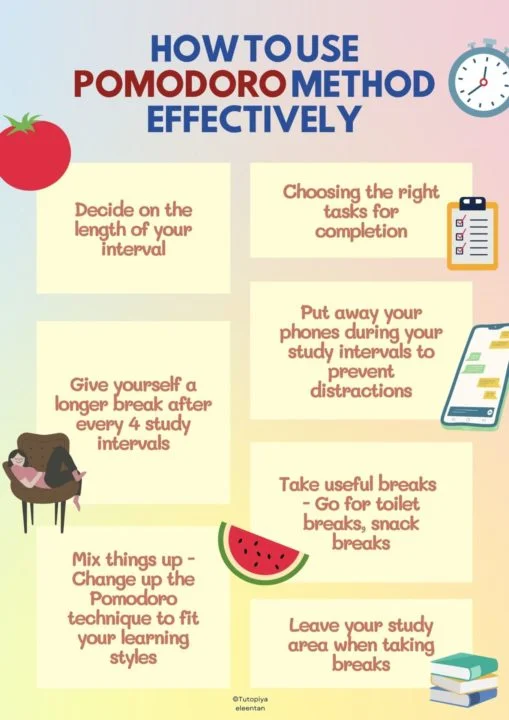
What is the Pomodoro Technique & How to Use it For Effective Studying
The Pomodoro study technique was developed by a university student who was struggling to focus on his studies and assignments. He asked for himself to stay concentrated for 10 minutes and grabbed a Pomodoro-shaped timer to time himself. And, the Pomodoro Technique was born. All you need for the technique to work is a timer.
Here is the method of the Pomodoro Technique:
1 - Get a to-do list and timer
2 - Set your timer for 25 minutes and focus on your task
3 - When time is up, stop and take a 5 minutes break
4 - Repeat for 4 intervals and take a longer break

How to use for effective study: The Pomodoro Technique
1 - Decide on how long you want your intervals to be.
25 minutes - 5 minutes break is a rough guide, but it depends on students. It depends on personal attention span and discipline to stay focused. If 25 minutes is too short, increase to 45 minutes or 50 minutes and give yourself 10 minutes break instead. The time can be altered according to preference and amount of tasks needed to complete.
2 - Refrain from straying too far away during breaks
Refrain from playing games or indulging in watching TV on your couch when you are having that break. You would not want to break your studying momentum and go back to procrastinating. Hence, it is best to keep clear of any possible distractions that can cause you to procrastinate. Instead, spend the break wisely by taking a walk around your house or grabbing yourself a cup of refreshing beverage.
3 - Choose the task you need to complete
Before you dive into your intervals, make sure you have a clear plan of what you want to accomplish by the end of your interval.
4 - Leave your study table when taking breaks
The technique is only useful when your brain understands that you are being rewarded after a long 50 minutes. You need a change of environment and things during your break to send a signal to your brain that you are resting. Do not pick up your book or start flipping through your textbook during your break. Do something relaxing instead.
5 - Make sure to give yourself a longer break after 4 intervals or cycles
This is to ensure that you are rewarding yourself and your brain. Take a 20-30 minutes break after a complete cycle.
6 - Put away your phones and other distractions during the interval
Turn off your phone’s notifications and put it far away from your study desk. Your short interval is precious time that you need to spend working on your assignments. Pomodoro’s intention is the intense focus for that designated time span. Hence, don’t waste your time!
7 - Mix things up!
The technique is here to serve as a guide, if you prefer longer intervals or even skipping some of your breaks in between to keep your momentum, by all means! You choose what is best for your learning style and can benefit you the most. It is also important to know sometimes breaks are essential for going a long way. Hence, do remember to check in with yourself and realize when you are losing focus or you need a break!


Why is Pomodoro useful

1 - Fights procrastination and restlessness
The Pomodoro technique promotes short timed intervals to help students or workers complete their tasks without being distracted. The Pomodoro technique usually takes 4 intervals of 25 minutes each with 5 minutes breaks in between. 25 minutes is a good amount of time for one to stay focused. Instead of seeing one entire essay to complete, you section into different smaller and manageable sections to work on every interval. It is less overwhelming and easier to accomplish, hence goodbye procrastination!

2 - Detailed task planning and execution
The short-timed interval gives students the opportunity to decide what they want to accomplish within that time frame. Are they aiming to finish their assignment or simply spend 25 minutes reading? This time interval helps students with time management too!

3 - Prevents overlearning
Because of the time interval introduced by the Pomodoro Technique, students stop when the timer goes off. It helps students to prevent overlearning and digesting certain material. When you are 90% confident in a subject, it is almost not recommended for students to spend another 20 hours to get that 10% when the 20 hours can be spent boosting your weaker subjects. Pomodoro is great to help students to delegate the right amount of time for the subject.
In a nutshell, there are several useful study techniques that are out there for students to use. These study techniques may not fit you, try our other study techniques here:
Read also: Active Recall and Spaced Repetition: How to Study Effectively

Written by
Tutopiya Team
Educational Expert
Related Articles

Which Is the Toughest Subject in IGCSE and How Can You Overcome It?
Tackle tough IGCSE subjects! Discover the hardest IGCSEs and get expert tips for success in Maths, Physics & more, essential for IB & A-levels.

Is 6 Months Enough to Prepare for IGCSE Exams?
Comprehensive guide and expert insights on educational topics for IGCSE, IB, and international curriculum students.

A-Level and IB Students: 6 Steps to Nail Your University Application
A-level & IB students: Nail your university application! Get expert tips on building a winning application for top international unis.


